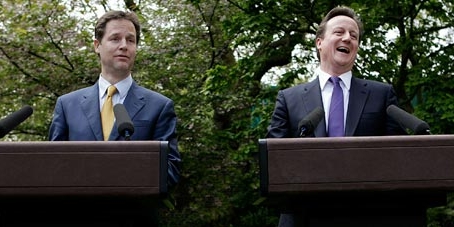
 In this post, Kristi Winters and Edzia Carvalho explain that, for all the criticisms, few participants in the Qualitative Election Study of Britain think that televised debates should be done away with altogether.
In this post, Kristi Winters and Edzia Carvalho explain that, for all the criticisms, few participants in the Qualitative Election Study of Britain think that televised debates should be done away with altogether.
There was a lot of debate about the televised debates again. Responding to critiques that the 2010 format only included the three main party leaders, significant changes were made for the 2015 televised exchanges. The Qualitative Election Study of Britain conducted focus groups before and after three televised party leaders’ appearances since the official start of the campaign. Our participants found a lot to criticize about the formats and even the idea of debates themselves. However, they also saw the debates as important and useful to the democratic process. Below we summarize the pros and cons of televised debates as reported by our participants and why, when pushed on whether debates should end or be continued, nearly all our participants said debates should remain part of the general election campaign.
The data come from focus groups held on the nights of the 7-way debate, the ‘challengers’ debate’, and the Question Time appearance of the three main party leaders, and from focus groups conducted at other times. We ran debate and non-debate focus groups in Scotland (Dundee), Wales (Cardiff) and England (Birmingham and Colchester) in April and May 2015. In our non-debate focus groups, some participants had watched the debates, while others had only seen coverage of them.
People who sat through the debates as part of our focus groups reported feeling they had learned something and were glad they had sat through and watched it all. In contrast the general tone of the discussion about debates in the non-debate watching groups was more negative and cynical. In both groups participants noted the political spin going on in the debates and were wary about taking politicians at their word.
The most common criticisms of the debates were:
- The major party leaders are too polished and stage managed.
- The presidentialization of British politics, where the focus is too much on the leaders rather than their parties’ policies.
- The debate formats (of seven, five and three participants) were unclear and caused confusion.
- The reason for including the smaller British parties but not Northern Irish ones was unclear.
- There were too much personal ‘back and forth’ between leaders rather than a discussion of specific policies.
- The tendency for some politicians to not answer the question asked but instead use what sounded like prepared soundbites.
- For those who watched more than one debate, some complained politicians said the same things in their opening or closing statements.
However the reactions to the debates were not entirely negative. The most common positive features were:
- People who might not otherwise have time to read all the manifestos could get a lot out of the debates.
- The debates were a way of getting people involved who were otherwise apathetic toward politics.
- It was good to see the party leaders under pressure and how they performed in real time.
- It was a good thing to have more than just the three main party leaders involved in the debates.
- Politicians should have to face the voters during an election and debates are a way to guarantee that.
- People learned new things from the debates, about the main party policies and about smaller parties and their leaders.
The 2010 QESB found a handful of wavering Liberal Democrat voters who reported, post-election, that the debates helped them make up their minds. The story this time around is different. Nick Clegg was already defined in the minds of voters, as was Nigel Farage. Based on our groups, the leaders who benefited most from participating in the debates were Nicola Sturgeon, Leanne Wood and Natalie Bennett. Those who had watched the debates had views on these women whereas those who did not most often reported not having an opinion or not knowing anything about them. Of the three, Nicola Sturgeon was described with words like ‘strong’ and ‘passionate’ which we think explains – at least in part – her net positive approval ratings right across Wales, England and Scotland. Voters’ views of the candidates sometimes shifted as a result of the debates. A few debate watchers remarked they noticed an improvement in Ed Miliband’s and Natalie Bennett’s performances over the course of the campaign.
In our non-debate night focus groups, after allowing a few minutes for participants to discuss and share their (generally negative) views on the debates, we pushed them a bit further by asking, ‘If you were given the power to say there would no longer be televised debates during campaigns in future, how many of you would eliminate them?’ Out of over 70 people in our pre-election focus groups, only 5 indicated they would. When asked why the general consensus was that, for all their flaws, they prefer to see the party leaders held accountable in a debate format rather than not.
Many participants indicated that they would prefer changes in the format and the content of the debates. The idea of a town hall or a local hustings event – something more along the lines of the Question Time format – was seen as a preferable alternative to the presidential-like debates. Participants also wished for specific policy discussions rather than leaders who were allowed simply to repeat platitudes. Although the debates in and of themselves were not cited as a reason for voting for one party rather than another, for undecided debate watchers the in-depth policy discussions helped them distinguish between different party positions.
It is quite likely that the debate about election debates will arise again before the next general election. Based on our participants’ responses, our recommendations to the Debates Commission are three-fold:
- Use a style that allows for more policy specifics in the debates, and get leaders to defend their party’s manifesto. Undecided voters in particular use the debates to find out what policies set the parties apart.
- Combine leaders’ debates with less-scripted public events. Many voters see a spontaneous interaction with the leaders in the hustings-style as an essential part of British democratic accountability.
- Communicate more clearly which parties will be invited to take part in the debates and the reasons why.
For all the problems, confusion and complaints about the 2015 debates, it is clear our participants do not want to eliminate debates all together. For better (debate format) or worse, people in future will expect their leaders to stand up in a televised format and defend their party’s policies to the voting public.
Note: This article gives the views of the authors, and not the position of the General Election blog, nor of the London School of Economics. Please read our comments policy before posting. More details about the Qualitative Election Study of Britain can be found here.
Kristi Winters is at GESIS-Leibniz Institute for the Social Sciences in Cologne. She tweets at @drkmwinters.
 Edzia Carvalho is a lecturer at the University of Dundee. She tweets at @EdziaNCM.
Edzia Carvalho is a lecturer at the University of Dundee. She tweets at @EdziaNCM.







